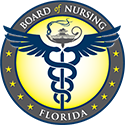Click on the appropriate tab below to see the Initial Licensing Requirements, Process, Fees, Statutes and Administrative Rules for a Certified Nursing Assistant by Examination.
A state-approved training program is not required prior to examination. A high school diploma or its equivalent, or be 18 years of age, is required if the applicant is challenging the exam without completion of an approved training program.
Applicants to become a Certified Nursing Assistant by Examination must successfully pass the required background screening and meet one of the following requirements:
- Has successfully completed an approved training program and achieved a minimum score, established by rule of the board, on the nursing assistant competency examination, which consists of a written portion and skills-demonstration portion approved by the board and administered at a site and by personnel approved by the department.
- Has achieved a minimum score, established by rule of the board, on the nursing assistant competency examination, which consists of a written portion and skills-demonstration portion (written portion only if the applicant successfully completed an approved training program within 6 months of applying), approved by the board and administered at a site and by personnel approved by the department and:
- Has a high school diploma, or its equivalent; or
- Is at least 18 years of age.
- Has completed the curriculum developed under the Enterprise Florida Jobs and Education Partnership Grant and achieved a minimum score, established by rule of the board, on the nursing assistant competency examination, which consists of a written portion and skills-demonstration portion, approved by the board and administered at a site and by personnel approved by the department.
Note: If an applicant fails to pass the nursing assistant competency examination in three attempts, the applicant is not eligible for reexamination unless the applicant completes an approved training program.
Electronic Fingerprinting
Applicants for initial licensure must use a Livescan service provider to have their fingerprints submitted electronically to the Florida Department of Law Enforcement (FDLE) for conducting a search for any Florida and national criminal history records that may pertain to applicant. The results will be returned to the Care Provider Background Screening Clearinghouse (Clearinghouse) and made available to the Department for consideration during the licensure process. The Livescan fingerprints submitted by the applicant will be retained by FDLE and the Clearinghouse. All costs for conducting a criminal history background screening are borne by the applicant. The Department cannot accept hard fingerprint cards or results. All results must be submitted electronically to the Clearinghouse.
It is important to use the correct Originating Agency Identification (ORI) when submitting fingerprints. If you do not provide an ORI number or if you provide an incorrect ORI number to the service provider, the board office will not receive your fingerprint results, so it is extremely important to use the correct ORI when having your fingerprints scanned.
Applicants can use any FDLE approved Livescan service provider to submit their fingerprints. The applicant is fully responsible for selecting the service provider and ensuring the results are reported to the Department. For more information, FAQs, and a list of all approved Livescan service providers please visit the Background Screening website.
Please take the CNA Exam Electronic Fingerprinting Form with you to the Livescan provider. Please check the service provider’s requirements to see if you need to bring any additional items. Please verify the Originating Agency Identification (ORI) number submitted by the livescan service provider matches the information provided.
Applicants with Criminal History
Any applicant who has ever been found guilty of or pled guilty or no contest/nolo contendere to any charge other than a minor traffic offense must list each offense on the application. Failure to disclose criminal history may result in denial of your application. Each application is reviewed on its own merits.
Staff cannot make determinations in advance as laws and rules do change over time. Violent crimes and repeat offenders are required to be presented to the Board of Nursing for review. Evidence of rehabilitation is important to the board members when making licensure decisions.
*Please note: In order to qualify for licensure, CNAs must also pass a background screening (in accordance with Sections 435.04, 435.07, and 408.809, FS) for employment with an Agency for Health Care Administration (AHCA) regulated facility (or qualify for an Exemption from Disqualification).
For Felony Disqualifying Offenses (regardless of adjudication), you would not be eligible for an Exemption until 3 years have passed since the completion of any non-monetary obligations (confinement, probation, community service, etc.). All fines, fees, restitution, etc. must also be paid in full.
Applicants with prior criminal convictions are required to submit the following documentation to the board:
Self-Explanation – Applicants who have listed offenses on the application must submit a letter in your own words describing the circumstances of the offense.
Final Dispositions/Arrest Records – Final disposition records for offenses can be obtained at the clerk of the court in the arresting jurisdiction. If the records are not available, you must have a letter on court letterhead sent from the clerk of the court attesting to their unavailability.
Completion of Probation/Parole/Sanctions – Probation and financial sanction records for offenses can be obtained at the clerk of the court in the arresting jurisdiction. Parole records for offenses can be obtained from the Department of Corrections or at the clerk of the court in the arresting jurisdiction. If the records are not available, you must have a letter on court letterhead sent from the clerk of the court attesting to their unavailability.
Letters of Recommendation – Applicants who have listed offenses on the application must submit 3-5 professional letters of recommendation from people you have worked for or with.
Applicants with Disciplinary History
Applicants who have ever been denied licensure, had disciplinary action taken against their license, or have action pending against their license to practice any health care related profession by a licensing authority are required to submit the following documentation to the board:
Self-Explanation – Applicants who have listed disciplinary action on the application must submit a letter in your own words describing the circumstances of the action.
Agency Records – All relevant documentation regarding the action should be sent to the board office by the licensing agency. If the records are not available, you must have a letter on agency letterhead sent from the licensing agency attesting to their unavailability.
Applicants with Health History
If a “Yes” response was provided to any of the questions in this section, provide the following documents directly to the board office:
A letter from a licensed health care practitioner, who is qualified by skill and training to address the condition identified, which explains the impact the condition may have on the ability to practice the profession with reasonable skill and safety. The letter must specify that the applicant is safe to practice the profession without restrictions or specifically indicate the restrictions that are necessary. Documentation provided must be dated within one year of the application date.
A written self-explanation, identifying the medical condition(s) or occurrence(s); and current status.
Health Care Fraud; Disqualification for License, Certificate, or Registration
Effective July 1, 2012, Section 456.0635, Florida Statutes (F.S.), provides that health care boards or the department shall refuse to issue a license, certificate or registration and shall refuse to admit a candidate for examination if the applicant:
- Has been convicted of, or entered a plea of guilty or nolo contendere to, regardless of adjudication, a felony under Chapter 409, F.S., (relating to social and economic assistance), Chapter 817, F.S., (relating to fraudulent practices), Chapter 893, F.S., (relating to drug abuse prevention and control) or a similar felony offense(s) in another state or jurisdiction unless the candidate or applicant has successfully completed a drug court program for that felony and provides proof that the plea has been withdrawn or the charges have been dismissed. Any such conviction or plea shall exclude the applicant or candidate from licensure, examination, certification, or registration, unless the sentence and any subsequent period of probation for such conviction or plea ended:
- For the felonies of the first or second degree, more than 15 years from the date of the plea, sentence and completion of any subsequent probation;
- For the felonies of the third degree, more than 10 years from the date of the plea, sentence and completion of any subsequent probation;
- For the felonies of the third degree under section 893.13(6)(a), F.S., more than five years from the date of the plea, sentence and completion of any subsequent probation;
- Has been convicted of, or entered a plea of guilty or nolo contendere to, regardless of adjudication, a felony under 21 U.S.C. ss. 801-970 (relating to controlled substances) or 42 U.S.C. ss. 1395-1396 (relating to public health, welfare, Medicare and Medicaid issues), unless the sentence and any subsequent period of probation for such conviction or pleas ended more than 15 years prior to the date of the application;
- Has been terminated for cause from the Florida Medicaid program pursuant to section 409.913, F.S., unless the candidate or applicant has been in good standing with the Florida Medicaid program for the most recent five years;
- Has been terminated for cause, pursuant to the appeals procedures established by the state or Federal Government, from any other state Medicaid program, unless the candidate or applicant has been in good standing with a state Medicaid program for the most recent five years and the termination occurred at least 20 years before the date of the application;
- Is currently listed on the United States Department of Health and Human Services Office of Inspector General’s List of Excluded Individuals and Entities.
1. Applicant submits completed application with all required fees to Prometric.
Be sure you have submitted the current version of the application, and that you have answered all questions (including providing a SSN if you have one) correctly, signed, and dated the application, and that your handwriting is legible to prevent any delays in receipt or approval of your application.
2. If you do not already have a shareable Livescan screening in the Agency for Health Care Administration’s (AHCA) Clearinghouse, then you will need to schedule an electronic fingerprint appointment (you can complete this step prior to applying to expedite the process). You can find a list of approved providers here; the Electronic Fingerprint Form can be given to the Livescan provider.
If you already have a shareable screening in the Clearinghouse, it will load within 72 hours of us receiving your application. It is very important that the name, DOB and SSN listed on your application match the information submitted with your screening. Any discrepancies will cause your results not to load automatically, and a copy of your Driver’s License and Social Security Card will be required in order to correct the discrepancy.
Note: It is statutorily required for you to have a photograph taken at the time of fingerprinting to be entered into the Clearinghouse. Without it, your screening can NOT be shared among state agencies. For a screening to be Clearinghouse-compliant and thus shareable, you must have a) retained fingerprints, b) photograph, and c) signed privacy policy.
If you completed a screening without a photograph (sometimes necessary with the hard card process) then your results may be entered in the Clearinghouse; however, they will not be shareable. For example, if you used an AHCA ORI number and did not have a photograph taken, the Department of Health cannot view or use the results of that screening for your application/license.
3. Once the application is received, a processor will review them. If any additional information is needed, you will be notified at that time.
4. Once your application is approved, you will be notified via email, and Prometric will receive your eligibility within 72 hours.
5. Prometric schedules your exam within 7-14 business days and sends out “admission ticket” for testing to you via email.
Applicants who fail one or both of the exams, would need to reapply with Prometric. Any information already on file that can be used will be, you would not need to submit duplicate information when reapplying.
Top 10 Tips for Exam Applicants
Applicants, both first-time and re-certifying, must pass the Prometric CNA Exam which is a two-part examination, consisting of a written and a performance (skills) section. The Written Test is a ninety (90) minute test with sixty (60) multiple-choice questions written in English. An Oral or Spanish Test may be requested for the Written Test if you have difficulty reading English and you must ask for it when you submit your application. The Manual Skills Evaluation requires the applicant to perform five (5) randomly selected nursing assistant skills.
The application and candidate information bulletins are available through the state’s contracted test administrator, Prometric.
Website: https://www.prometric.com/nurseaide/fl
Email: FLCNA@prometric.com
Phone: (888) 277-3500
Examination: All fees are paid directly to Prometric and the Livescan service provider.
Click on Chapter or Section Number to View
Florida Statutes
Chapter 464, Part II: Certified Nursing Assistants
Chapter 456: Health Professions and Occupations: General Provisions
Chapter 435: Employment Screening
Section 408.809: Background Screening; prohibited offenses
Florida Administrative Code
Chapter 64B9-15: Certified Nursing Assistant






